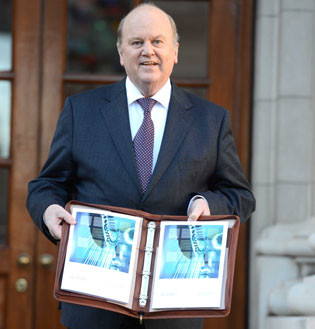Fiachra Ó Raghallaigh | Contributing Writer
On October 4th, the government will be asking the citizens of Ireland to decide whether or not we want to abolish the Seanad. The main argument being put forward for abolition is that it will save us €20m a year. That figure has already been proven to be incorrect – indeed the Clerk of the Dáil has stated on the record that the true figure is less than €10m per annum. However, rather than getting bogged down in the detail of how much really would be saved, I would like to challenge the fundamental premise of the government’s argument – that saving money is a legitimate reason to abolish our upper house of parliament.
Whatever way you look at it, there is something fundamentally perverse about the government’s suggestion that we should abolish the Seanad to save money. It seems we are living in an age in which austerity permeates every part of our public discourse. There may be legitimate reasons why this is the case, but any reasonably minded person should be appalled at the suggestion that a functioning legislature is a luxury that we cannot afford. It is one thing to cut the salaries of consultants and high ranking public servants, but it is another to crudely amputate an organ of the state. That is not to argue that cost savings that result out of political reform are immoral and unwelcome – merely that they shouldn’t be the overriding concern. While a cheap and efficient government is something few people in this country would disagree with, I would also wager that transparency, accountability and democracy are of equal, if not greater, concern. If we want good laws, we need good legislators, and if we want good legislators then we must be willing to pay for them. Of course, the government will argue that the Seanad doesn’t possess enough good legislators, and it is hard to find fault with this argument. However, it does not take a genius to figure out the source of that problem. The Seanad electoral system is completely undemocratic and doesn’t create enough incentives for Senators to carry out legislative work. However, not only can this system be reformed, but the template to reform it already exists.
I would like to challenge the fundamental premise of the government’s argument – that saving money is a legitimate reason to abolish our upper house of parliament.
There are four possible ways to become a senator. Eleven senators are nominated by An Taoiseach, three are elected by graduates the University of Dublin, three by graduates of the National University of Ireland, and forty three are elected by county councillors through the Vocational Panel system. It should be of no surprise that these four different electoral systems present four very different kinds of senator. Taoiseach’s Nominees will fulfil a wide variety of roles, whether as an extra vote to support the government, or in representing a particular segment of society that the Taoiseach feels should be promoted. Senators elected by county councillors will spend a significant portion of their time representing their interests – usually by handling social welfare queries and passport applications that councillors sends their way. Meanwhile, Senators elected through the University panels are usually chosen for their policy experience. Examples of such senators include Criminal Law Professor and gender equality activist, Ivana Bacik, Consultant oncologist, Professor John Crown and transport economist Professor Seán Barrett.
The difference between the character of the senators that are elected through the University Panels, and those that are elected by county councillors through the Vocational panels could not be starker. The former tend to be experts in their fields or representatives of minority groups within the political system. The latter tend to be career politicians. Therefore, if we are going to ask ourselves how to get better value for money from the Seanad, then reforming the electoral system is the obvious place to start. Unfortunately, this is a solution that the government has simply refused to consider. Not only has it dismissed out of hand the enormous pile of reform proposals gathering dust over the past ten years, but it has ignored repeated calls from the opposition to put the issue before the Constitutional Convention to receive public consultation. For a referendum that will either amend or delete a whopping total of 72 articles in our constitution, this seems like a remarkably cavalier attitude by the government.
While a cheap and efficient government is something few people in this country would disagree with, I would also wager that transparency, accountability and democracy are of equal, if not greater, concern.
Meanwhile, an effective reformed Seanad is within the government’s power to give. The Quinn-Zappone Seanad Reform Bill 2013 shows just how simple and attainable reform is. This bill foresees a gender equal, democratically elected upper house with special representation provided for citizens living abroad, and if it were passed our Seanad would become what it always should have been: a chamber of experts and representatives of minority groups within Irish society. Significantly, none of this requires a referendum, and given this fact, we must ask ourselves what their real motives are. Is this a cost saving measure, or do they merely want to remove a potential thorn in their side?
Whatever the answer, it is time for the Irish people to tell the Government that you cannot place a price on democracy. Instead of falling for cheap slogans, we should demand real political reform. The fact is that Ireland is at a crossroads, and the momentum behind political reform has never been greater. However, we cannot expect the establishment to reform itself, and if we prove ourselves easily duped by populist, anti-political cost-saving arguments, then this talk of reform will never come to much.







